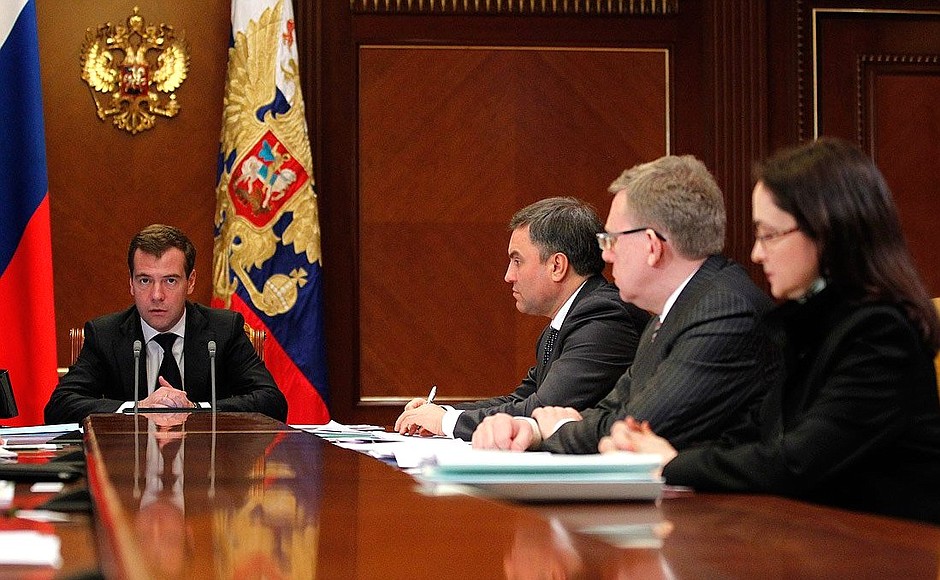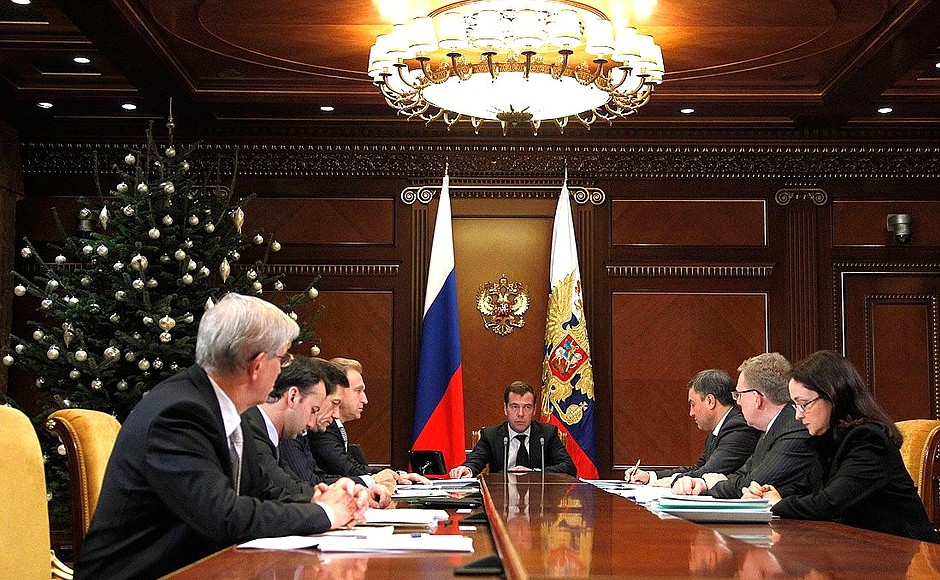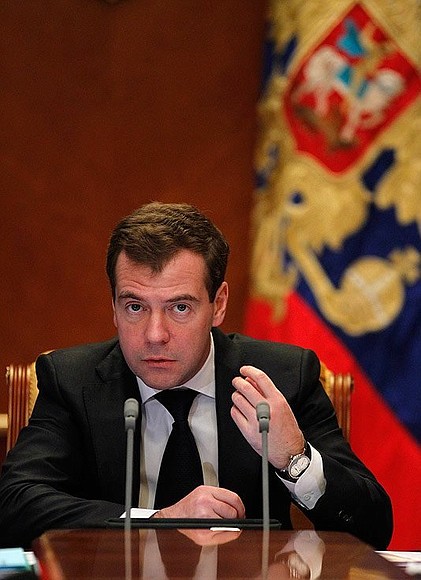The President noted that, despite the fact that in 2010 the nation was still recovering from the global economic crisis, there were many positive developments in the socioeconomic sphere. The GDP grew by 4%, while in 2009 it fell by 10%. Unemployment decreased to 6.7% and wages have been on the rise while all of the Government’s social commitments have been fulfilled and funded.
Among future challenges, the President highlighted the need to enhance the investment climate in the country, improve the situation in the food market, lower inflation, continue integration within the Customs Union and establish a Common Economic Space.
***
President of Russia Dmitry Medvedev: Good afternoon,
We are nearing the end of 2010. It has brought us difficulties as well as certain successes. But in discussing the socioeconomic situation, I think we can say that overall, more of the events have been positive. When we worked together to overcome the consequences of the global financial crisis at the end of 2008 and beginning of 2009, we did not fully realise how long this recession would last, how difficult it would be for the global economy and consequently, the Russian economy to come out of it. Nevertheless, I feel that in general, the way our economy has developed this year is not the worst possible scenario. Moreover, it has generally turned out to be fairly orderly and favourable.
Unfortunately, it was affected by our domestic difficulties, including a certain economic reality – namely, the structural flaws of the Russian economy. We suffered from a very difficult, abnormally hot summer and the wild fires it has brought. Ultimately, this turned out to be detrimental to our agriculture, and as a result, we lost a significant portion of our crops, which in part explains the decline in our macroeconomic indicators. Still, overall, these indicators really do look decent: last year, we had almost a 10 per cent drop, but this year, we will see growth of nearly 4 per cent which, of course, looks significantly better.
Our most important accomplishment, aside from the GDP increase, is the situation on the market: we were able to stabilise it. Unemployment fell down to 6.7 per cent according to the International Labour Organisation calculation methods; this means millions of people who have found jobs again. Salaries continued to grow. In real terms, they already exceed pre-crisis levels. And of course – and this is particularly important for our nation – we were able to maintain social stability. We didn’t cut on any of our social commitments and managed to fully finance them.
”I feel that in general, the way our economy has developed this year is not the worst possible scenario. Moreover, it has generally turned out to be fairly orderly and favourable.“
Next year we will need to resolve a wide range of challenges, which, of course, also involve overcoming the global financial crisis. Investment demand is recovering at a slow pace. From January to August this year, investment volumes grew by only 2.8 per cent, but they had fallen by nearly 20 per cent during the same period last year; so comparing it to the same period last year, we can still call it a victory.
Nevertheless, as far as my subjective assessments are concerned, unfortunately, our nation’s investment climate, to put it lightly, leaves something to be desired; it is bad. And perhaps that is precisely what the Government should work on next year. Yes, we were able to overcome the effects of the crisis. We helped people, we dealt with unemployment, and we met our social commitments. In that regard, the Government did its job. But the investment climate is very complicated, and there are both objective and subjective reasons for this. I am not suggesting that we work on this today. We held a major meeting this year on this topic, I gave a series of instructions, and they are being implemented. In all likelihood, we will need unconventional measures in order to change this situation.
Another issue concerns the situation on the market. Because of the bad harvest, many basic foods have become more expensive, particularly grains, bread, and milk. This hits our average citizens in their pockets, and naturally, we cannot help but notice it. We must take every measure we can to somehow remedy the situation. In any event, it requires our constant attention, because overall, the situation on the global food market is not very favourable, and it is not our problem alone.
I am not even mentioning inflation rates. Unfortunately, we did not maintain the parameters we had set for ourselves, including as a result of the events that occurred on the agricultural and food market. Rates are now predicted to reach nearly 8.5 per cent, and ultimately, as far as I understand, it is expected to be even higher; I would like you to tell me about it today. But in any case, we need to follow the course that was set some time ago and consistently work on lowering inflation during the upcoming year.
Another matter I’d like to discuss is our foreign economic policy. This year, the Customs Union’s mechanisms began to function. This is a major political victory and a serious economic test. Thus, we are happy about our integration. But at the same time, we must be fully equipped to respond to problems concerning entry into the Customs Union, which, as with anything, gives us advantages and also creates certain difficulties.
In July, the Customs Code came into force and we saw the emergence of a common customs territory. So in anticipation of creating a Common Economic Space and the Eurasian Union as declared by ourselves and other nations, we certainly have a great deal of work ahead of us so as to make the situation on our market stable and favourable, and at the same time, for us to respond to various kinds of difficulties related to the creation of a Common Economic Space.
That’s my brief analysis of what has been done this year.
<…>


